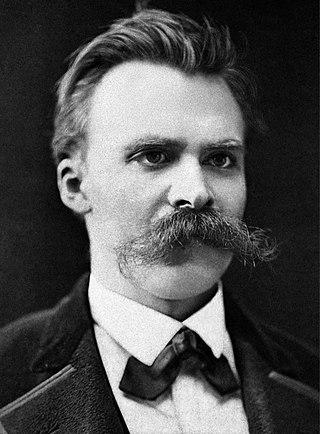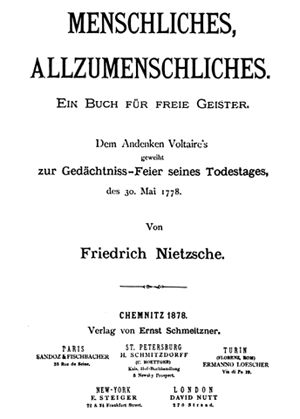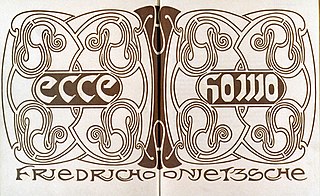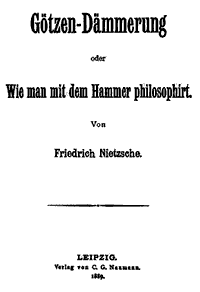The Four Great Errors
The Error of Confusing Cause and Consequence
Nietzsche argues that moral and religious statements are in error because they mistake causes for effect.
Take, for example, this moral statement: If P is virtuous, then P will be happy. Nietzsche insists that the opposite is true: If P is happy, then P will be virtuous. "A well-constituted human being, a 'happy one,'" he writes, "Must perform certain actions and instinctively shrinks from other actions … [H]is virtue is the consequence of his happiness." [1] In Nietzsche’s view, that which follows from instinct is marked by being "easy, necessary, free," is good. It is instinct, not conscious effort, which is the hallmark of virtuous behavior. Most moral maxims, in Nietzsche's view, reflect an absolutist position which suggest that certain moral behaviors are appropriate for everyone irrespective of the unique histories and circumstances of individual moral agents. "Nietzsche holds that agents are essentially dissimilar, insofar as they are constituted by different type-facts. Since Nietzsche also holds that these natural type-facts fix the different conditions under which particular agents will flourish, it follows that one morality cannot be good for all." [2]
The Error of False Causality
Moral and religious statements are in error because they attribute human behavior to the existence of human will, spirit, and ego, the factual reality of which Nietzsche finds questionable.
People, Nietzsche maintains, mistakenly believe that they make decisions freely, attributing these decisions to the "inner facts" or notions of will, spirit, and ego. Nietzsche argues against the existence of these three notions. For example, will does not cause events to occur, it only accompanied them (Nietzsche also points out that it is possible for some events to not be accompanied by any will). Similarly, Nietzsche holds that spirit, in the form of motive, is merely an accompaniment to an action, but not a cause of it. Finally, he argues that the ego is simply a fiction. In short, there are no spiritual causes for human behavior.
The Error of Imaginary Causes
Nietzsche argues that when an event occurs, this event causes ideas in the mind, ideas which the subject mistakenly believes to be the cause of the original event. Nietzsche attributes the confusion over causes of an event to a basic human psychological need to eliminate the discomfort caused by the unknown. "To trace something unknown back to something known," he writes, "Is alleviating, soothing, gratifying and gives moreover a feeling of power." [3]
This human aversion to the unknown or the unexplained, Nietzsche warns, may cause people to accept ideas based solely on their emotional appeal rather than on their factual accuracy. When experiencing an event, Nietzsche describes, a subject compares this current event to similar events in the past in his or her memory. As a result, the subject develops "causal interpretations," habits of memory and not an examination of the actual causes of the event in question. This is done, Nietzsche believes, because, causes or events that we find in memory are comforting to us because they are familiar. Causes that are "new," "unexperienced," or "strange," are not valued because they do not soothe our anxiety over the unknown.
These cause ascriptions, Nietzsche argues, eventually become more and more prevalent until they develop into systems of thought (as examples of these, Nietzsche gives business, romantic love, and Christianity). The problem with such systems is that they ultimately "exclude other causes and explanations." [4] Systems of thought, Nietzsche maintains, can be an epistemological roadblock, preventing people from determining and verifying the real causes of events.
The Error of Free Will
Nietzsche argues that the notion of human free will is an invention of theologians developed fundamentally in order to exert control over humanity by "making mankind dependent" on them. The invention of a human free will, Nietzsche thinks, is rooted in a human drive to punish and judge.
"Everywhere accountability is sought, it is usually the instinct of punishing and judging which seeks it. One has deprived becoming of its innocence if being in this or that state is traced back to will, to intentions, to accountable acts: the doctrine of will has been invented essentially for the purpose of punishment, that is of finding guilty." [5]
Egoism is a philosophy concerned with the role of the self, or ego, as the motivation and goal of one's own action. Different theories of egoism encompass a range of disparate ideas and can generally be categorized into descriptive or normative forms. That is, they may be interested in either describing that people do act in self-interest or prescribing that they should. Other definitions of egoism may instead emphasise action according to one's will rather than one's self-interest, and furthermore posit that this is a truer sense of egoism.

Friedrich Wilhelm Nietzsche was a German philosopher, prose poet, cultural critic, philologist, and composer whose work has exerted a profound influence on contemporary philosophy. He began his career as a classical philologist before turning to philosophy. He became the youngest person ever to hold the Chair of Classical Philology at the University of Basel in 1869 at the age of 24. Nietzsche resigned in 1879 due to health problems that plagued him most of his life; he completed much of his core writing in the following decade. In 1889, at age 44, he suffered a collapse and afterward a complete loss of his mental faculties, with paralysis and probably vascular dementia. He lived his remaining years in the care of his mother until her death in 1897 and then with his sister Elisabeth Förster-Nietzsche. Nietzsche died in 1900, after experiencing pneumonia and multiple strokes.
Moral relativism or ethical relativism is used to describe several philosophical positions concerned with the differences in moral judgments across different peoples and cultures. An advocate of such ideas is often referred to as a relativist for short.
A fallacy is the use of invalid or otherwise faulty reasoning in the construction of an argument which may appear to be a well-reasoned argument if unnoticed. The term was introduced in the Western intellectual tradition by the Aristotelian De Sophisticis Elenchis.
The Übermensch is a concept in the philosophy of Friedrich Nietzsche. In his 1883 book, Thus Spoke Zarathustra, Nietzsche has his character Zarathustra posit the Übermensch as a goal for humanity to set for itself. The Übermensch represents a shift from otherworldly Christian values and manifests the grounded human ideal.
"God is dead" is a statement made by the German philosopher Friedrich Nietzsche. The first instance of this statement in Nietzsche's writings is in his 1882 The Gay Science, where it appears three times. The phrase also appears in Nietzsche's Thus Spoke Zarathustra.

Human, All Too Human: A Book for Free Spirits is a book by 19th-century philosopher Friedrich Nietzsche, originally published in 1878. A second part, Assorted Opinions and Maxims, was published in 1879, and a third part, The Wanderer and his Shadow, followed in 1880.

The Antichrist is a book by the philosopher Friedrich Nietzsche, originally published in 1895. Although it was written in 1888, its content made Franz Overbeck and Heinrich Köselitz delay its publication, along with Ecce Homo. The German title can be translated into English as either The Anti-Christ or The Anti-Christian, depending on how the German word Christ is translated.
Antisexualism is opposition or hostility towards sexual behavior and sexuality.
The fact–value distinction is a fundamental epistemological distinction described between:
- 'Statements of fact', based upon reason and physical observation, and which are examined via the empirical method.
- 'Statements of value', which encompass ethics and aesthetics, and are studied via axiology.

Ecce Homo: How One Becomes What One Is is the last original book written by philosopher Friedrich Nietzsche before his death in 1900. It was written in 1888 and was not published until 1908.
This is a list of writings and other compositions by Friedrich Nietzsche.

Friedrich Nietzsche (1844–1900) developed his philosophy during the late 19th century. He owed the awakening of his philosophical interest to reading Arthur Schopenhauer's Die Welt als Wille und Vorstellung and said that Schopenhauer was one of the few thinkers that he respected, dedicating to him his essay Schopenhauer als Erzieher, published in 1874 as one of his Untimely Meditations.

Twilight of the Idols, or, How to Philosophize with a Hammer is a book by Friedrich Nietzsche, written in 1888, and published in 1889.
The 19th-century philosopher Friedrich Nietzsche is known as a critic of Judeo-Christian morality and religions in general. One of the arguments he raised against the truthfulness of these doctrines is that they are based upon the concept of free will, which, in his opinion, does not exist.
Idola tribus is a category of logical fallacy, normally translated as "Idols of the Tribe", which refers to a tendency of human nature to prefer certain types of incorrect conclusions. It is a Latin term, coined by Sir Francis Bacon and used in his Novum Organum, one of the earliest treatises arguing the case for the methodical approach of modern science.
Idola fori, sometimes translated as "Idols of the Market Place" or "Idols of the Forum", are a category of logical fallacy which results from the imperfect correspondences between the word definitions in human languages, and the real things in nature which these words represent. The term was coined in Latin by Sir Francis Bacon and used in his Novum Organum, one of the earliest treatises arguing the case for the logic and method of modern science.
Idola specus, normally translated as "Idols of the Cave", is a type of logical fallacy whereby the peculiar biases of individuals lead them to errors. This Latin term was coined by Sir Francis Bacon and used in his Novum Organum, one of the earliest treatises arguing the case for the logic and method of modern science. He described them as deriving from "the peculiar constitution, mental or bodily, of each individual; and also in education, habit, and accident".
Idola theatri is a type of tendency towards logical fallacy or error, normally translated as "idols of the theatre". The Latin was coined by Sir Francis Bacon in his Novum Organum—one of the earliest treatises arguing the case for the logic and method of modern science. Bacon described them as "Idols which have immigrated into men's minds from the various dogmas of philosophies, and also from wrong laws of demonstration." He named them Idols of the Theater "because in my judgment all the received systems are but so many stage plays, representing worlds of their own creation after an unreal and scenic fashion."

Buddhist thought and Western philosophy include several parallels.





